25 Creative Ways to Collaborate with Other Bloggers and Brands

One of my biggest pet peeves with bloggers is the isolation attitude. I see it a lot, often in old websites and businesses that have been around for decades. It's an old-fashioned mindset, but closing yourself off from collaboration also closes yourself off from growth.
The idea goes like this: I'm a business owner, and I want to corner the market. To do so, I spend my marketing budget on advertising my brand. All of the content I produce promotes me. I will never so much as mention another website.
It's almost as if these business owners are scared that they'll leave if anyone finds out about their competition. The barest thought of mentioning another business or acknowledging that it exists will hurt them in some way or give visitors the wrong idea.
Usually, this comes from the fear that competitors are better and that they can't stand up to them, which isn't true all that often. After all, a core part of operating a business is having a unique selling proposition and a reason for customers to do business with you. If your value is that you're "the only one on the market," you're in a highly vulnerable position. Their companies have more to offer than this, so this fear is unfounded.
It might also stem from an awareness of SEO, thinking that linking out to other websites somehow "leaks" your link juice, and by minimizing outbound links, you're somehow benefitting your site. This SEO technique doesn't work, at least not how they think it does.
"Linking to other websites is a great way to provide value to your users. Often, links help users to find out more, to check out your sources and to better understand how your content is relevant to the questions that they have." - John Mueller, Google
Here's the official video from Google Search Central:
I say all of this because, well, I'm not too fond of walling yourself off from other websites. It can be frustrating when businesses refuse to acknowledge that they're not alone. Linking to other websites doesn't hurt you; in fact, there's plenty of evidence to suggest links help you:
- Links back up your facts and claims, making your content more legitimate and trustworthy.
- They improve user experience - if a user wants to dig more into a subject you linked to, they can read more.
- Links give search engines a better understanding of your site and your content.
- They enable you to form valuable relationships with the websites you're mentioning.
Now, direct competitors, I can understand - you shouldn't link to them all that often unless you have to. It's probably not in your best interest to form a partnership or collaboration with them.
For others in your broad niche, your industry? For bloggers who write about the topic, even if they aren't fans of yours? For other bloggers, reporters, journalists, and content creators? Ignoring them is leaving a lot of the value from blogging on the table.
Pop quiz: What's the number one most important part of SEO, next to your content?
Where do you get backlinks? Well, the best backlinks come from high-value sites in their own right that are authoritative, and most importantly, relevant to your industry.
If you're entirely ignoring other bloggers and brands in your industry, you're alienating yourself from 95% of the backlinks you could be getting. All of the best links I've secured for my site were from other bloggers who reached out to me or were from me reaching out to other bloggers. My clients are the same way.
So, for those willing to network with bloggers and brands, here are 25 options that you can use to get started.
#1: Interview Other Bloggers
As a blogger, you want to position yourself as an authority. What better way to build that authority than to have other people defer to you for an interview? It builds up your trustworthiness because your readers will think, "this guy is worth paying attention to; they got X Famous Blogger to do an interview!"

How do you do it? Come up with a topic and a set of interview questions. Then, start pitching bloggers who are authorities in that niche until one or more of them bites. Promise to link to them, excite them, and publish their content, and you're good to go.
#2: Apply to Be Interviewed
You can do the above technique in reverse as well. There are always going to be bloggers who conduct interviews with authorities in your niche. Look for those interviews when they're published. When you find them, reach out to the blogger who posted them. Offer a bio of yourself, who you are, why you're noteworthy, and what your expertise centers around.
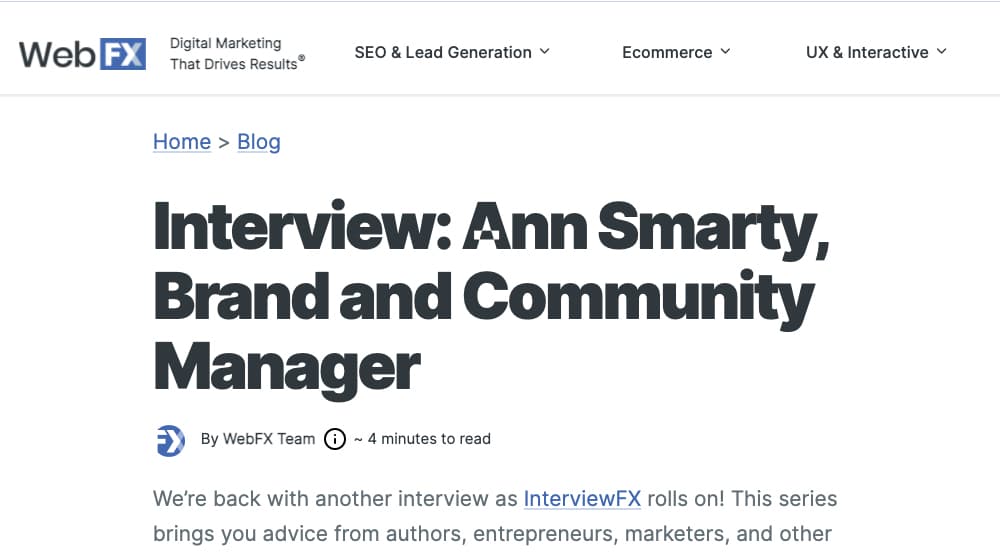
Then, ask if they'd consider interviewing you as well. This strategy has a bit lower of a success rate than being the interviewer, but it can be great when it works. Ann Smarty wrote a great guide on this here, and she's been interviewed on a ton of blogs:
#3: Partnership Content Series
Often, two or more authorities in a given niche can partner with one another to create a top-tier, industry gold standard piece of content. Pick a topic you're an authority on, and find another leader in the space who might be open to collaboration. Offer to go halfsies on a significant piece of content (think the Moz SEO guide as an example) and promote it 50/50.
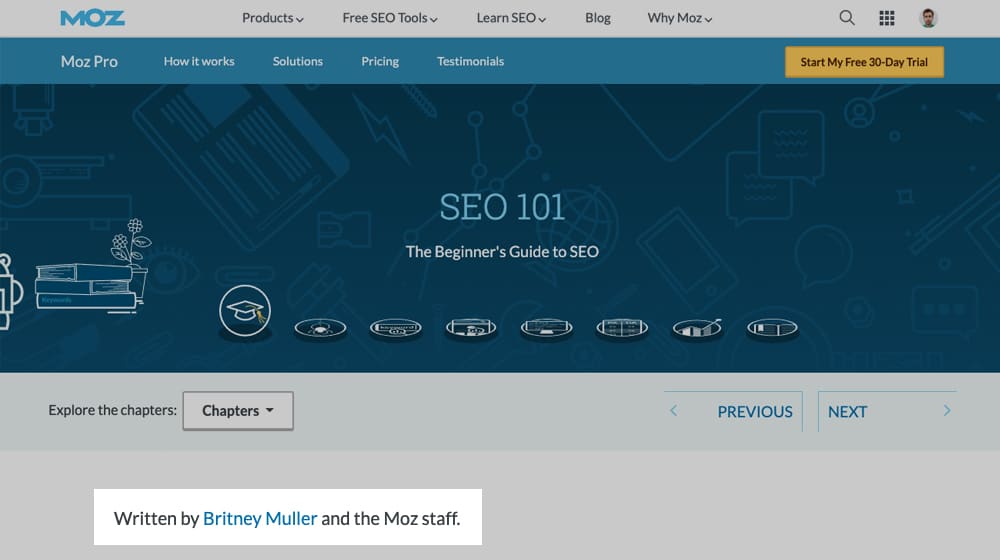
With luck, you can collaborate on a mutually beneficial piece of effective content that showcases both of your expertise.
Your newsletter is one of the best marketing channels you have available to you. It's a pre-selected audience of people who have self-filtered to be only those interested in you, your business, or your topic. You're not the only one with a mailing list, either. So, why not partner with another blogger and share that value?
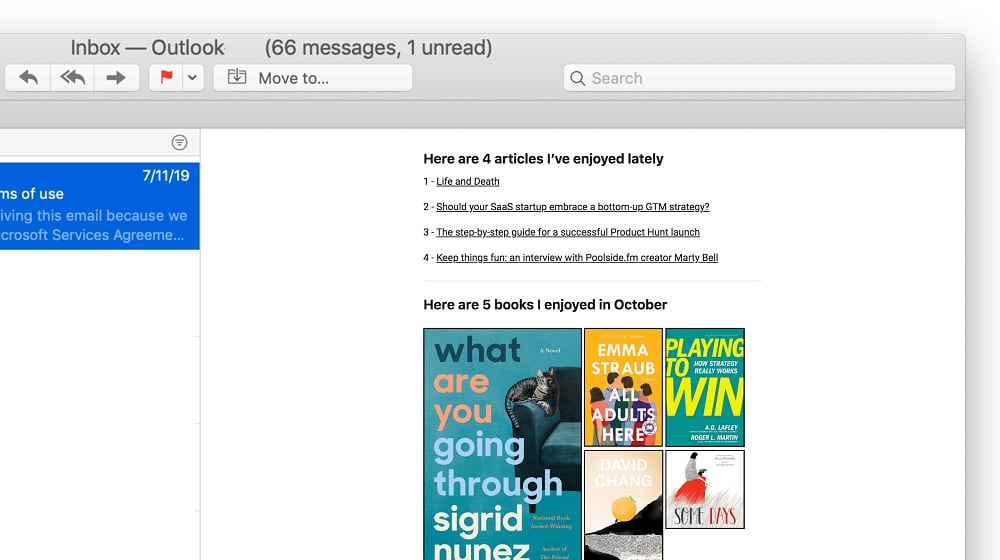
Offer a trade. You'll mention/recommend the blogger's brand if they do the same to you, to your respective newsletter audiences. It could be a great fit as long as it's relevant, organic, and potentially tagged as sponsored content. Just try to keep the audiences even; you won't be able to get a blogger with 100,000 subscribers to trade when you only have 4,000 people on your mailing list.
Another "trade" option is social media mentions. You can do this organically or artificially.

Organically, whenever you mention or link to a blogger, a piece of content, or a product in an article, tag that person when you share the blog post on social media. Often, this will get their attention and get a share or mention from them later. It's not guaranteed, but it's organic and beneficial.
Artificially, you can approach influencers and ask to trade mentions. "I'll mention you if you mention me." It's a bit gray hat, but as long as it's suitable and organic, how could anyone call you on it?
A social media takeover is an advanced social media strategy that some brands and influencers use. Essentially, you hype up an "event" where, for 24 hours, someone else takes over your social media. You can read more about this here.
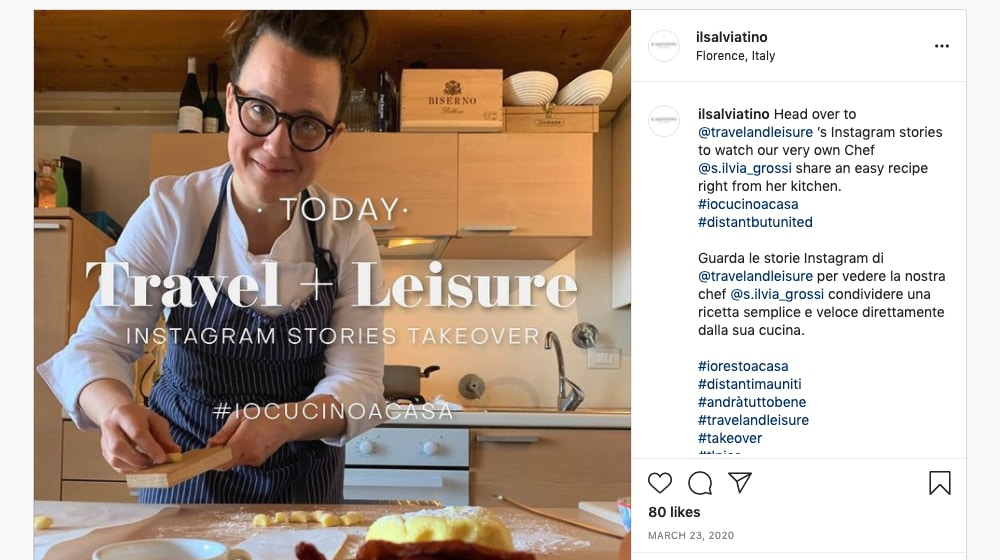
It can be a fun and exciting project, but it also has the potential to backfire if your audience doesn't like the brand that's taking you over (or vice versa). So, it requires a lot of planning.
#7: Product Review Posts
One option that is always available to a blogger is reviewing products offered by other bloggers and brands. I've done a lot of reviews, and so has just about every blogger I know. I write reviews occasionally because a company's products or services are popular, and I want to share my experience.
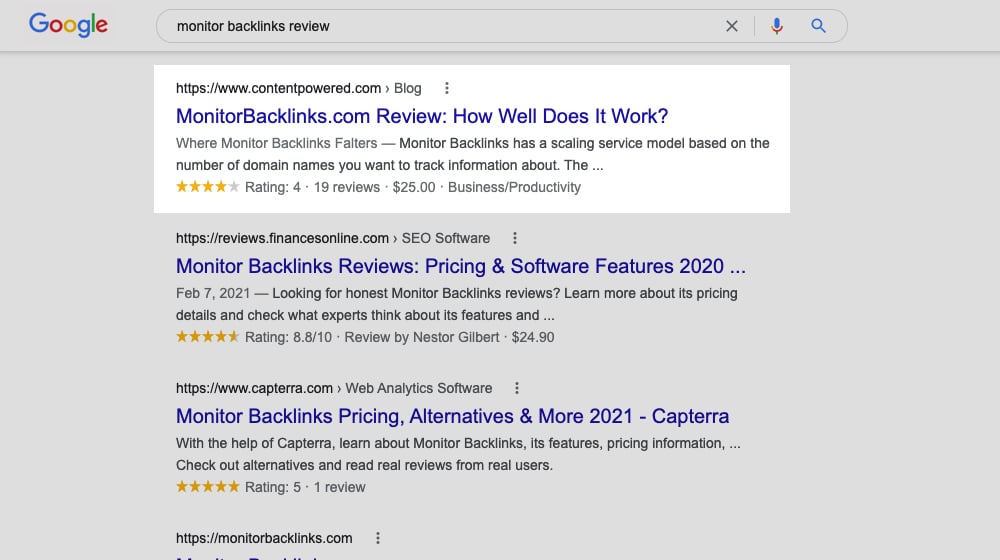
One thing you can do is accept offers from brands. A typical offer is "we'll give you a product/subscription/access, and you review us." As long as you're honest with your review, it can be very successful.
#8: Free Trial Outreach
Flip the last option on its head. I'm assuming that you're not just a blogger and that you're selling a product or service as well. So, you can reach out to other bloggers and ask for a review by providing a trial, a month of access, a free product, or what have you.
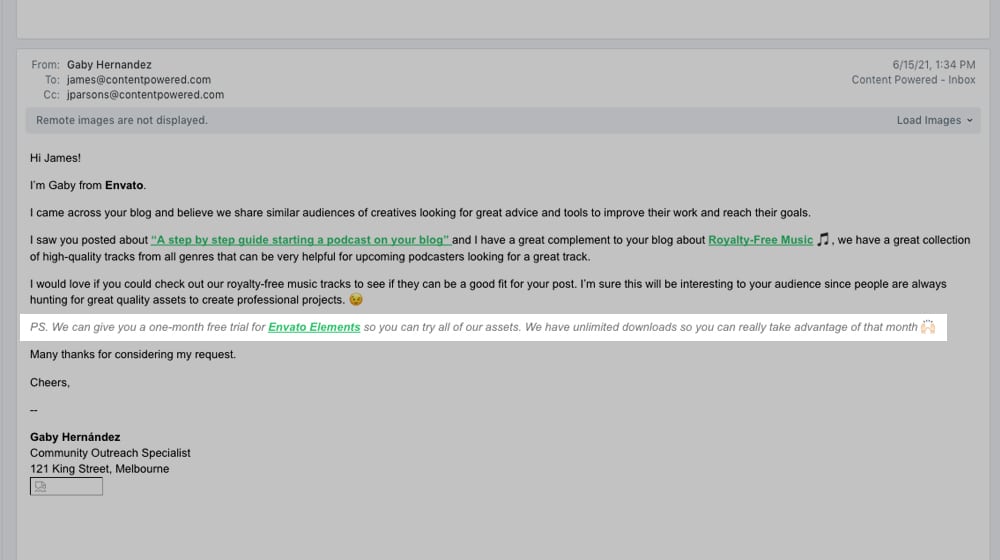
Just like when you're writing reviews, make sure you're not trying to pressure them into a positive review; ask for their honest opinions, good and bad.
#9: Tip and Trick Compilation Posts
A compilation post is a favorite of mine, but they're a ton of work to do. The process sounds simple, but it's tedious and time-consuming.
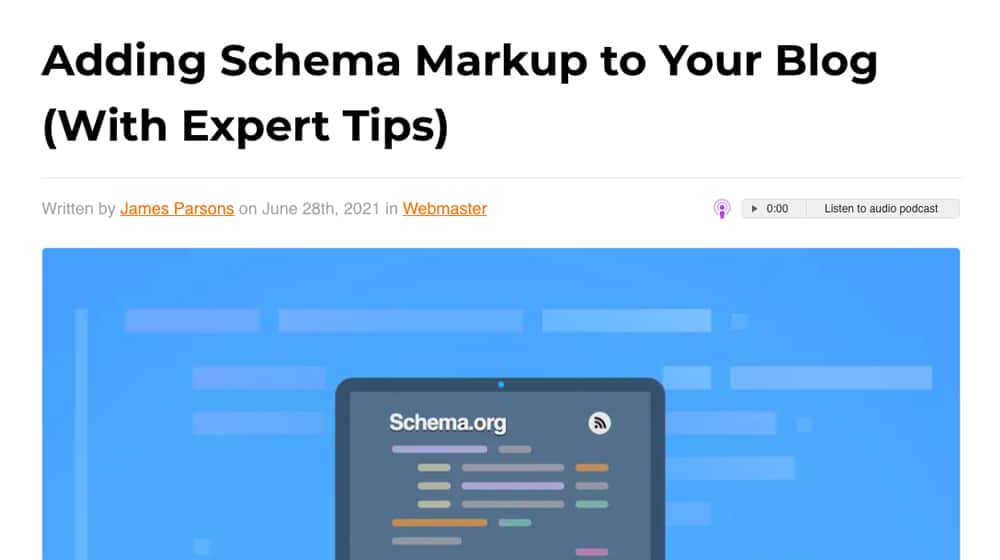
How do you do it?
- Come up with a single question or short set of questions on a given topic.
- Compile a list of 10-100 bloggers in your niche who are authorities on the subject.
- Email all of those bloggers asking if they'd be willing to write up a quick answer to the questions for your post.
- Wait.
- Wait some more.
- Follow up.
- Wait some more.
- Compile the answers that slowly trickle in.
- Publish your compilation post.
- Suddenly get more responses, frantically edit and re-promote the post.
As an alternative, you can always use HARO to bring the bloggers and experts to you; skip down to #18 on this list to read more. The resulting content is an excellent link and social quote bait, but it's a pain to create. That's why I've only done it a couple of times.
You can see an example of a compilation post that I've created here.
#10: Content Roundup Posts
Another way to create link bait and get many social mentions is to create a roundup series. Decide on a frequency (weekly, biweekly, and monthly all work) and then create a series. Every period, make a post on your blog that compiles the top content published in your industry during that time. Then, follow a ton of RSS feeds and blogs to monitor content and pick your favorites. Don't forget to share your roundup on social media and tag the people that you've mentioned!
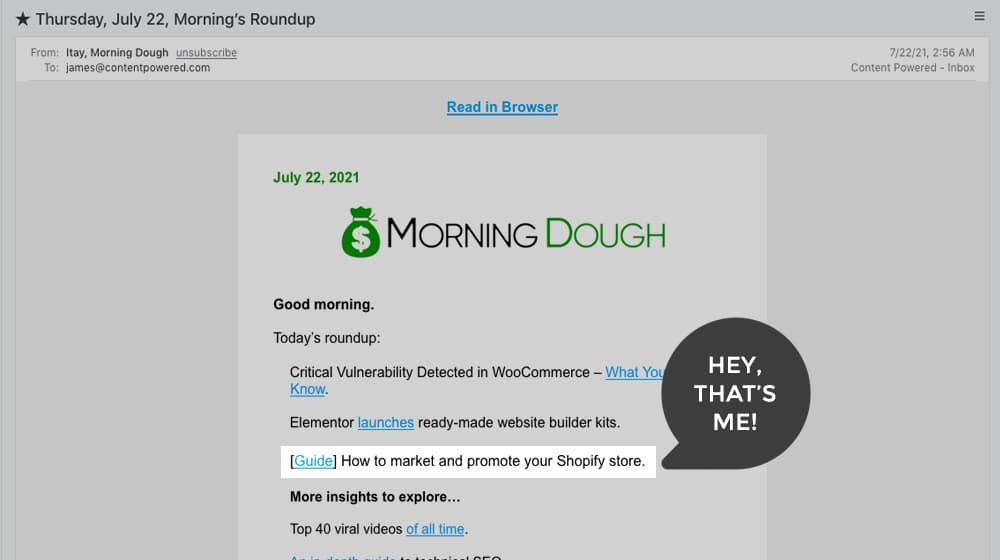
I'm regularly mentioned in many roundup posts, such as The Morning Dough. They send traffic to my site, and I provide high-quality content for their subscribers. Those relationships weren't formed by themselves.
#11: Blog Comment Networking
Blog commenting isn't a great way to get links, but it's an excellent way to network with other bloggers. Follow the blogs of influential people in your niche, and when they publish new content, leave an insightful and interesting comment. Try to ask a question, if possible, or verify/refute what they say with data of your own. In other words, engage with them. Over time, they'll learn to recognize you and grow to know you, and you can leverage that for more other value, including different strategies on this list.
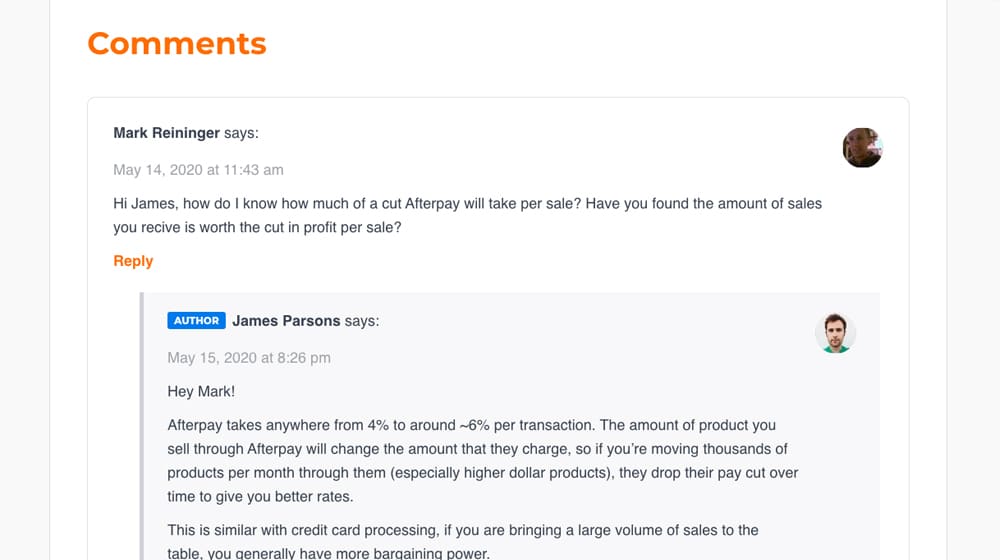
I love it when bloggers comment on my articles because it improves the value of my content, and I reciprocate by commenting on their articles. Everybody wins. As I've mentioned on this blog a handful of times, I think blog comments are among the most underrated SEO strategies. Seriously.
#12: Influencer Marketing
Influencer marketing is its whole big thing, so I'm not digging too deep into it here. Identify influential content creators in your industry, whether they're bloggers, social media superstars, or other forms of content creators. Then, try to network with them, offer partnerships and sponsorships, and otherwise form relationships.
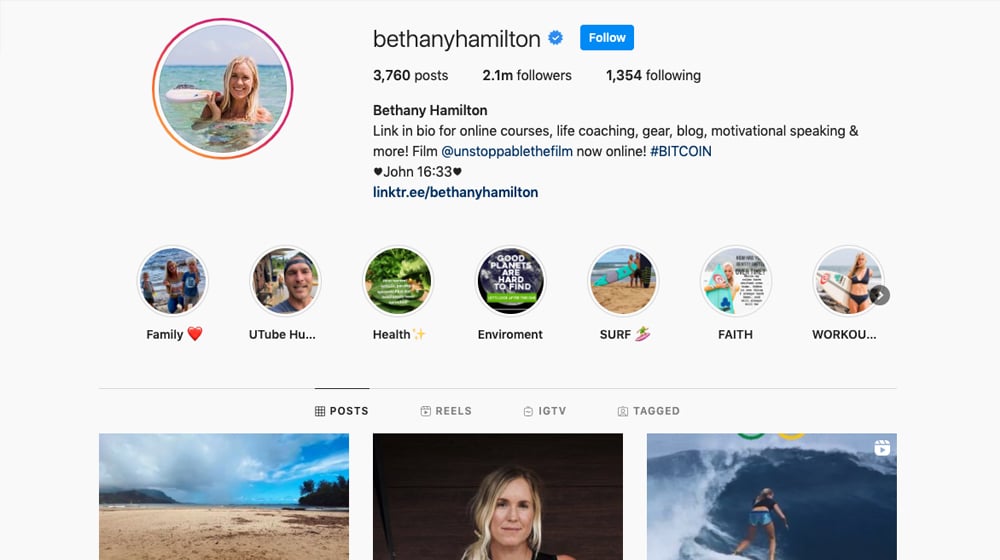
It can be surprisingly effective.
#13: Bundle Giveaways
We all know that giveaways can attract a lot of visitors, but that attention doesn't last. So, why not come up with a different goal? An excellent way to use a giveaway for networking is by forming a partnership to promote someone through it.

Create a product or service bundle and approach the people who make those products or services and ask if they'd like to sponsor the giveaway by providing the prizes in exchange for the promotion. It works surprisingly well, so long as what you're giving away is valuable enough.
#14: Event Sponsorships
Social distancing efforts put a damper on traditional event marketing and sponsorships, but as the world returns to life, so do organized events. You can offer to sponsor an event hosted by someone else in your niche (and thus get some advertising for it), or you can organize an event and solicit sponsorships from others in your industry.

They're both excellent options, though you need the organizational chops to handle an event for the latter.
#15: Twitter Chat Hosting/Participation
Twitter Chats are organized events hosted on Twitter, where they have a defined start time, end time, and topic, all centered around a hashtag. Participants use that hashtag to discuss an issue, while organizers guide the topics and discussion (possibly using the information they get in other blog posts).
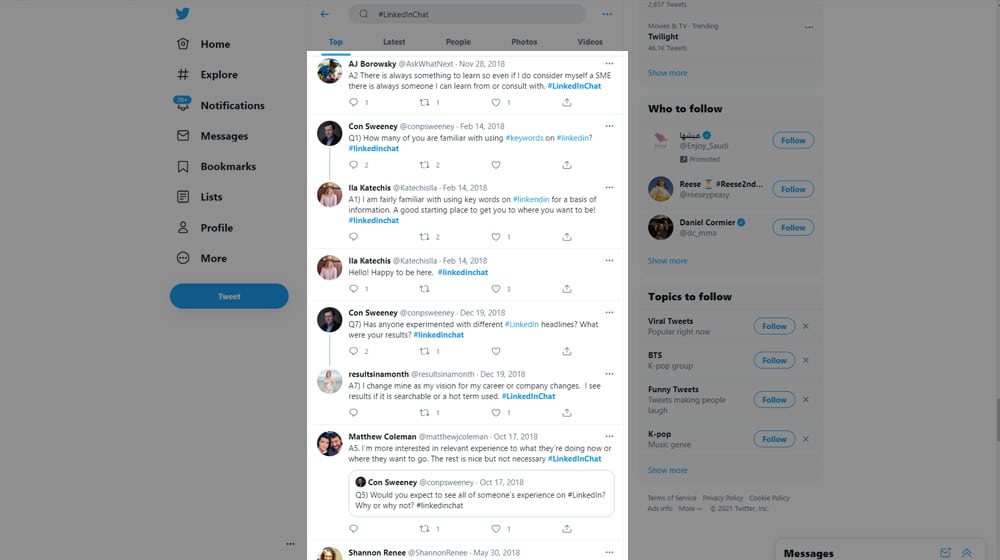
You can host a Twitter Chat or simply participate in them, gaining exposure and networking along the way.
#16: Sponsored Posts
One of the most common ways to network with other bloggers and brands is to allow sponsored blog posts on your site. This strategy can be a great way to get content and network with a brand, but you need to be aware of the SEO implications of that networking and flag the content (both in metadata and in text for your audience) as sponsored.
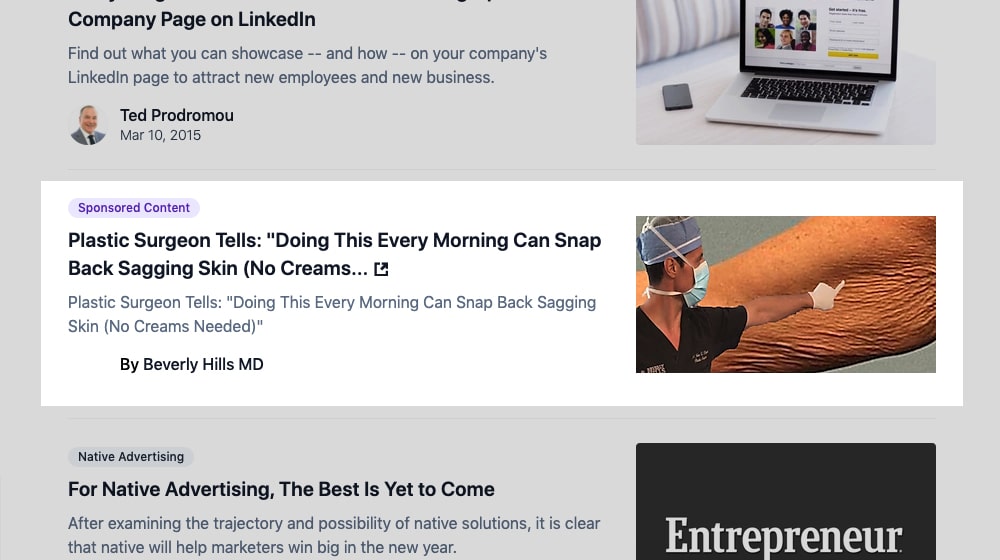
The sponsored tag protects you from search engine penalties by being transparent and upfront with Google about the sponsored article.
#17: Affiliate Posts
Much like sponsored content, affiliate content is an excellent way to network with another brand or blogger, sharing each other for additional value. Also, like sponsored posts, you need to make sure you flag affiliate content as affiliate content because "undisclosed affiliates" is a search penalty waiting to happen and can even be in violation of FTC regulations.
#18: HARO
HARO stands for Help A Reporter Out, and it's one of the few legitimate, useful networking websites out there. As a blogger and brand owner, you can read pitches from reporters asking for anything from quotes to interviews. You can then respond to them and get citations quickly and easily.
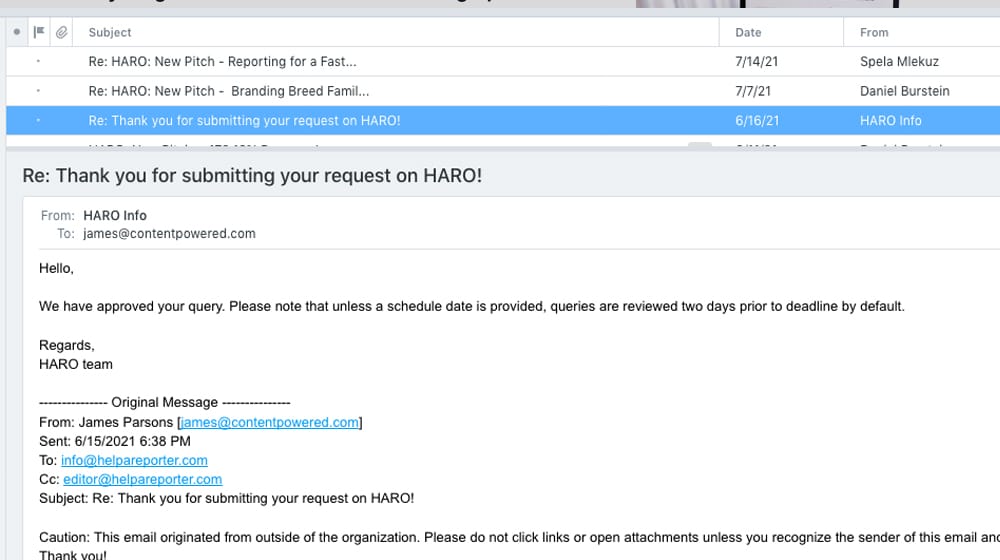
If you want to give HARO a try, I recommend a couple of posts I wrote on the subject. First, how often do pitches get accepted? It's more common than you think, but you may need to do some legwork to track it because reporters aren't always good at following up saying they published your pitch. And, for tips on writing a better pitch, I have a guide.
#19: Joint Live Video Events
Live video (or "live" prerecorded video) is becoming more and more common, with platforms like Twitch, YouTube Live, Facebook Streaming, Instagram TV, and others all working as ways to reach an audience with live video.
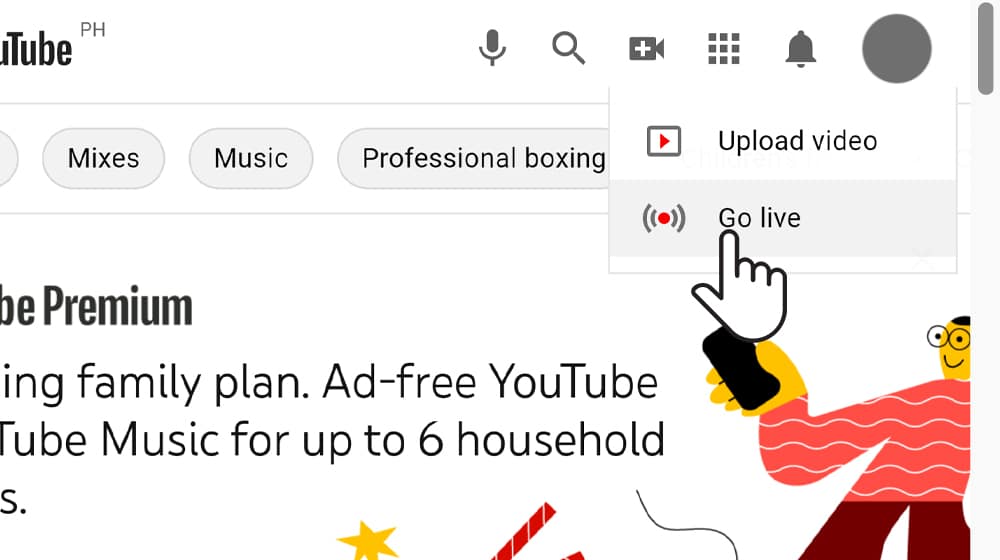
Rather than go it alone, though, you can partner up with another brand or blogger for your video productions. Either host a show and have them on as guests, guest on other shows, or form a partnership for regular collaboration.
#20: Liberal Linking Policies
This one might seem like a no-brainer, but I've had way too many customers and bloggers I know refuse to link to other sites or automatically nofollow every link they post. The thing is, if you never link out, what incentive do people have to link to you? You're showing that you're not participating in the broader community. Link out frequently, and leave the links followed unless you have a good reason not to. If a site is smaller or brand new and you don't want to take the risk, it may be good practice to nofollow those links. Don't use nofollow too much, and don't avoid it altogether - you should review each link individually.
#21: Submit Guest Posts
Guest posting might not be an innovative way to network, but it's effective. You can pitch guest post ideas to all manner of bloggers throughout your industry and niche. They can build up your author profile and name recognition, they can get you unlinked mentions, and they can even get you backlinks. As long as your content is unique, valuable, high-quality, and on target for the audience it's reaching, you'll build an excellent guest reputation.
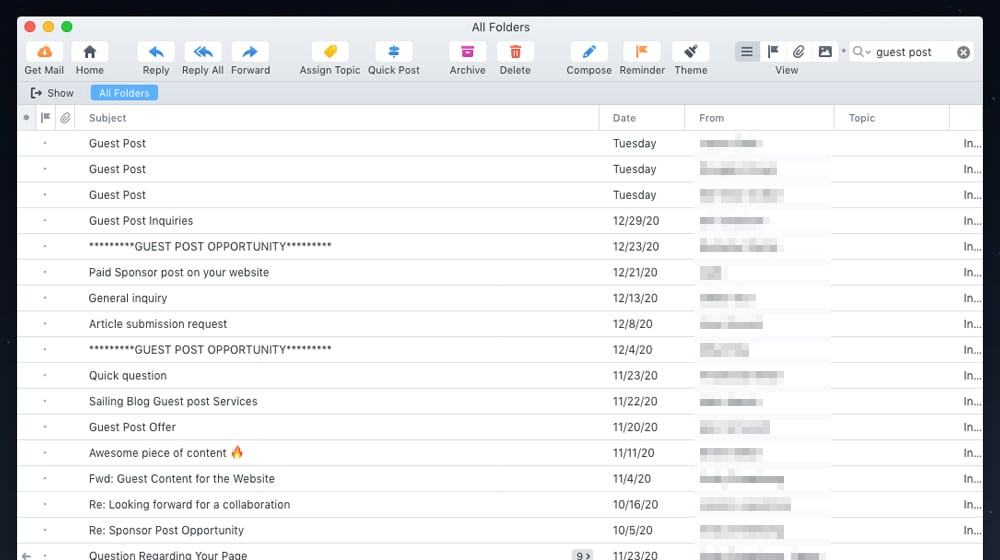
You probably get a lot of emails for guest posts already; most of them are junk, but some of them are gold. Some of my best links were from people emailing me, as well as with my clients.
I had to sift through a bunch of spam emails to find them, but they exist. Don't ignore those emails completely.
#22: Accept Guest Posts
Another technique is to accept guest posts on your site. You can use a "Write for us" link or simply ask bloggers if they would like to post. You can even accept some of those email pitches we all get, though I'd be careful about picking only the best of them. Publish high-quality content and give some value to the poster, and you'll build up your network quite quickly.
If you decide to accept guest posts, just make sure you're very picky and post rigid guidelines.
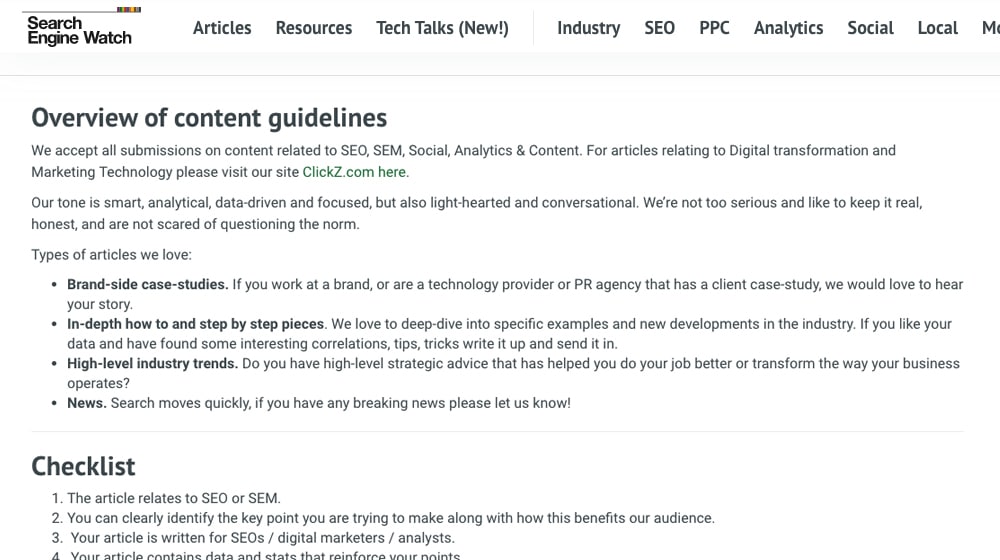
Only accept the best contributions, check each one for plagiarism with Copyscape, check for grammar, and make sure they followed your guidelines. Try hiding a question or a riddle in your guidelines to make sure they actually read them and to root out spam.
#23: Tribe Promotion
Bloggers are always looking for ways to promote themselves and each other, so they tend to form tribes. It might be through a dedicated "tribe" site like Triberr, or it might just be through Facebook Groups.
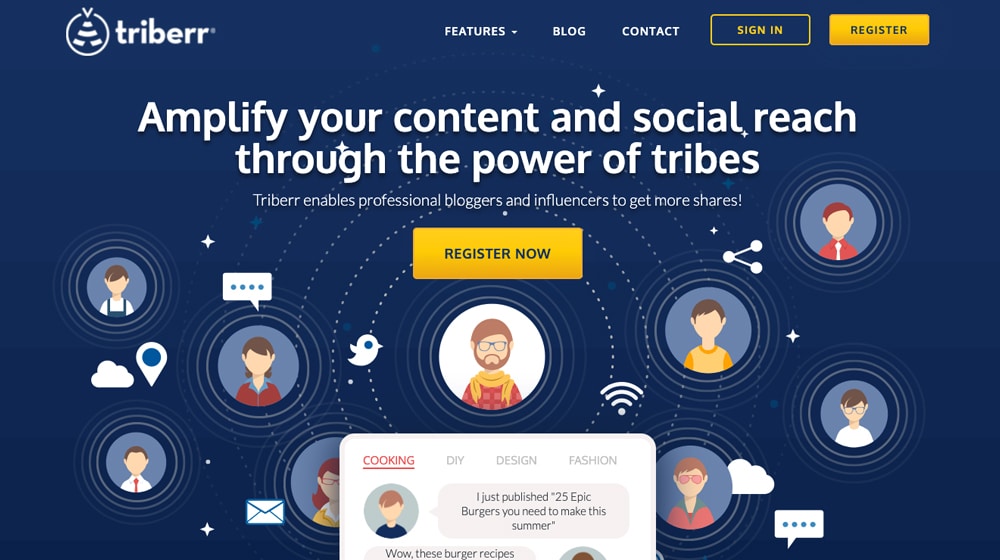
Either way, building a mutually beneficial network or joining one that already exists is a great option.
#24: Create an Industry Challenge
It takes a certain amount of authority to get a challenge off the ground, but why not give it a try if you have that position? Come up with a challenge (fundraising competition, build a new site challenge, etc.) and promote it. Prizes for the winner can be a great incentive, too.
#25: Guest on Podcasts
Podcasts are growing in popularity, and it's straightforward to participate in them. You can sponsor them, but you can also guest on them. Identify industry podcasts, listen to enough of them that you're familiar with the style and content, and approach them with an idea and offer to join as a guest. As long as you have a decent microphone and the tech to make it a smooth experience for the podcaster, you're probably good to go.

So, there you have it; 25 interesting, creative, and effective ways to network with bloggers and brands in your niche and industry. There's a lot there; which are your favorite techniques?










Comments